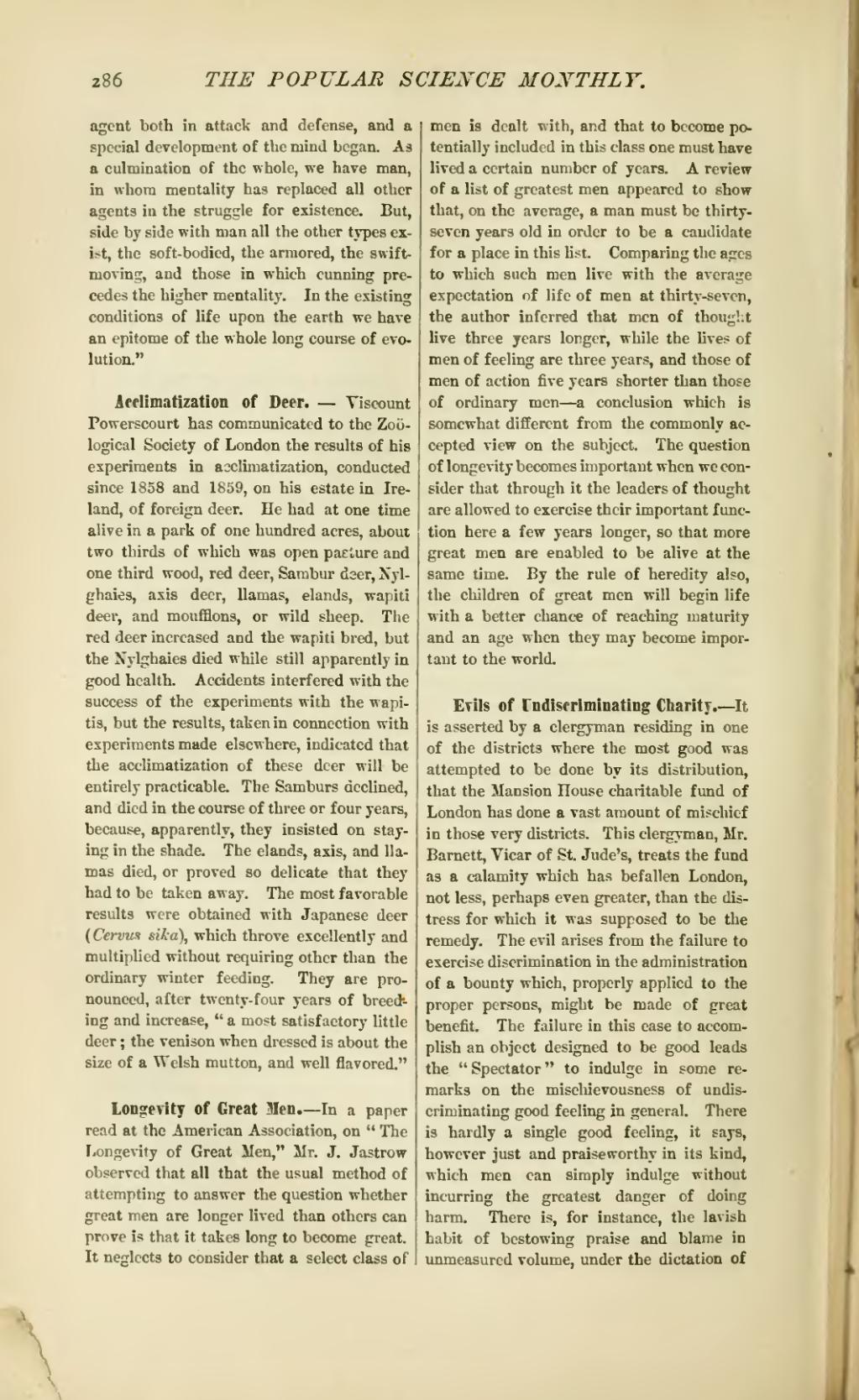agent both in attack and defense, and a special development of the mind began. As a culmination of the whole, we have man, in whom mentality has replaced all other agents in the struggle for existence. But, side by side with man all the other types exist, the soft-bodied, the armored, the swift-moving, and those in which cunning precedes the higher mentality. In the existing conditions of life upon the earth we have an epitome of the whole long course of evolution."
Acclimatization of Deer.—Viscount Powerscourt has communicated to the Zoölogical Society of London the results of his experiments in acclimatization, conducted since 1858 and 1859, on his estate in Ireland, of foreign deer. He had at one time alive in a park of one hundred acres, about two thirds of which was open pasture and one third wood, red deer, Sambur deer, Nylghaies, axis deer, llamas, elands, wapiti deer, and moufflons, or wild sheep. The red deer increased and the wapiti bred, but the Nylghaies died while still apparently in good health. Accidents interfered with the success of the experiments with the wapitis, but the results, taken in connection with experiments made elsewhere, indicated that the acclimatization of these deer will be entirely practicable. The Samburs declined, and died in the course of three or four years, because, apparently, they insisted on staying in the shade. The elands, axis, and llamas died, or proved so delicate that they had to be taken away. The most favorable results were obtained with Japanese deer (Cervus sika), which throve excellently and multiplied without requiring other than the ordinary winter feeding. They are pronounced, after twenty-four years of breeding and increase, "a most satisfactory little deer; the venison when dressed is about the size of a Welsh mutton, and well flavored."
Longevity of Great Men.—In a paper read at the American Association, on "The Longevity of Great Men," Mr. J. Jastrow observed that all that the usual method of attempting to answer the question whether great men are longer lived than others can prove is that it takes long to become great. It neglects to consider that a select class of men is dealt with, and that to become potentially included in this class one must have lived a certain number of years. A review of a list of greatest men appeared to show that, on the average, a man must be thirty-seven years old in order to be a candidate for a place in this list. Comparing the ages to which such men live with the average expectation of life of men at thirty-seven, the author inferred that men of thought live three years longer, while the lives of men of feeling are three years, and those of men of action five years shorter than those of ordinary men—a conclusion which is somewhat different from the commonly accepted view on the subject. The question of longevity becomes important when we consider that through it the leaders of thought are allowed to exercise their important function here a few years longer, so that more great men are enabled to be alive at the same time. By the rule of heredity also, the children of great men will begin life with a better chance of reaching maturity and an age when they may become important to the world.
Evils of Undiscriminating Charity.—It is asserted by a clergyman residing in one of the districts where the most good was attempted to be done by its distribution, that the Mansion House charitable fund of London has done a vast amount of mischief in those very districts. This clergyman, Mr. Barnett, Vicar of St. Jude's, treats the fund as a calamity which has befallen London, not less, perhaps even greater, than the distress for which it was supposed to be the remedy. The evil arises from the failure to exercise discrimination in the administration of a bounty which, properly applied to the proper persons, might be made of great benefit. The failure in this case to accomplish an object designed to be good leads the "Spectator" to indulge in some remarks on the mischievousness of undiscriminating good feeling in general. There is hardly a single good feeling, it says, however just and praiseworthy in its kind, which men can simply indulge without incurring the greatest danger of doing harm. There is, for instance, the lavish habit of bestowing praise and blame in immeasured volume, under the dictation of

